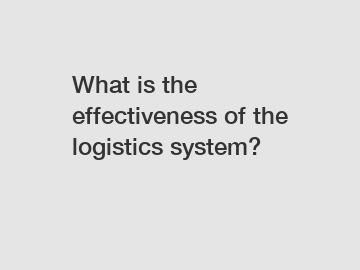What is the effectiveness of the logistics system?
What is the effectiveness of the logistics system? .
In today's fast-paced world, logistics systems play a critical role in the success of businesses. These systems are responsible for managing the flow and storage of goods, ensuring that they reach their intended destination in a timely and cost-effective manner. As businesses strive to stay competitive, it's crucial to evaluate the effectiveness of their logistics system. In this article, we will delve into the various aspects of logistics effectiveness and explore its impact on businesses. .
1. Cost Efficiency:

One of the primary factors to consider when evaluating the effectiveness of a logistics system is cost efficiency. A well-designed system should optimize costs by identifying the most economical transportation routes, minimizing inventory carrying costs, and streamlining warehouse operations. By incorporating advanced technologies like data analytics and automation, businesses can improve their cost efficiency significantly.
2. Timely Delivery:
The ability to deliver goods on time is crucial to maintaining customer satisfaction and building a solid reputation. An effective logistics system should ensure prompt delivery, minimizing delays and providing accurate tracking information. By utilizing real-time data and implementing efficient delivery routes, businesses can achieve faster and more reliable deliveries, thereby enhancing customer loyalty and trust.
3. Inventory Management:
Another essential aspect of logistics effectiveness is efficient inventory management. A well-optimized system should prevent overstocking and minimize stockouts, ensuring that goods are available when needed without tying up excessive capital. Implementing techniques such as just-in-time (JIT) inventory management and adopting inventory tracking technologies can greatly improve inventory management processes.
4. Collaboration and Communication:
Additional resources:What is the technology behind contactless payment?
Revolutionize Your Logistics with Efficient ERP Design: Boost Efficiency & Streamline Operations
Which message queue is best for microservices?
Which Humidor Box Hardware Best Complements Cigars?
How do I get a channel webhook?
What is the architecture of message broker?
10 Game-Changing Logistics Software Solutions Unveiled
A successful logistics system relies on effective collaboration and communication among stakeholders. This includes seamless coordination between suppliers, manufacturers, distributors, and retailers. By employing integrated software solutions and establishing clear communication channels, businesses can foster collaboration, minimize errors, and improve overall efficiency.
5. Flexibility and Adaptability:
The ability to respond quickly to changing market demands is crucial in today's dynamic business environment. An effective logistics system should be flexible and adaptable, capable of accommodating unforeseen circumstances and adjusting to fluctuations in demand. By employing agile strategies, businesses can optimize their logistics processes and ensure swift responses to market changes.
6. Customer Satisfaction:
Customer satisfaction is the ultimate goal of any business, and a well-designed logistics system can significantly contribute to achieving this objective. By ensuring timely deliveries, accurate order tracking, and efficient handling of returns, businesses can provide a superior customer experience. Satisfied customers are more likely to become repeat customers and promote positive word of mouth, driving the growth of the business.
7. Risk Management:
An effective logistics system incorporates risk management practices to mitigate potential disruptions. This includes having contingency plans for natural disasters, transportation strikes, or supplier failures. By proactively identifying and addressing risks, businesses can minimize disruptions and maintain a seamless flow of goods, thereby reducing financial and reputational losses.
In conclusion, the effectiveness of a logistics system is crucial for businesses to thrive in today's competitive landscape. By focusing on cost efficiency, timely delivery, inventory management, collaboration and communication, flexibility, customer satisfaction, and risk management, businesses can create a logistics system that drives growth and provides a competitive edge. Regular evaluation and improvement of the system will ensure continued success in meeting customer expectations and delivering value. So, what is the effectiveness of your logistics system?
Contact us to discuss your requirements of parcel management software create, smart First-leg transportation software, Parcel Fulfillment System dashboard. Our experienced sales team can help you identify the options that best suit your needs.
Additional resources:Which Slack bot can outsmart ChatGPT in conversation?
How can you tell if a LV watch is real?
Revolutionizing Supply Chain Efficiency: Is Advanced End-to-End Logistics Software the Game Changer?
Uncover the Power of Seamless-AI: Revolutionizing Google Users’ Search Experience!
Which is the best chatbot integration for Slack at the purchase stage?
What is the use of cloud computing in logistics?
Which Watch Box Brand Offers the Best Storage Capacity for 6 Watches?
81
0
0
Related Articles
-
47
0
0
-
40
0
0
-
Unlocking Supply Chain Transparency with End-to-End Logistics Software
Unlocking Supply Chain Transparency with End-to-End Logistics Software.
53
0
0
-
38
0
0
-
39
0
0
-
47
0
0
-
54
0
0
-
39
0
0









Comments
All Comments (0)